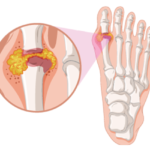The 2017 recommendations are updated to reflect changes in medical literature, as well as to include newly approved drugs.


Ruth Jessen Hickman, MD, was born and raised in eastern Kentucky, where she first cultivated her love of literature, writing and personal narratives. She attended Kenyon college, where she received a Bachelor of Arts in philosophy, summa cum laude. She worked with individuals with psychiatric conditions and later in a neuroscience lab at the University of Illinois, Chicago, before graduating from Indiana University Medical School in 2011. Instead of pursuing clinical medicine, Ruth opted to build on her strength of clearly explaining medical topics though a career as a freelance medical writer, writing both for lay people and for health professionals. She writes across the biomedical sciences, but holds strong interests in rheumatology, neurology, autoimmune diseases, genetics, and the intersection of broader social, cultural and emotional contexts with biomedical topics. Ruth now lives in Bloomington, Ind., with her husband, son and cat. She can be contacted via her website at ruthjessenhickman.com.

The 2017 recommendations are updated to reflect changes in medical literature, as well as to include newly approved drugs.

From the first substantial argument in the 19th century that uric acid played a role in gout, it took about 100 years for the medical community to accept its role in triggering acute inflammatory gout attacks. Two papers, both published in 1962, helped demonstrate the link between uric acid and acute gout attacks, quickly opening…

Although the diagnosis and treatment of gout are sometimes straightforward, practitioners encounter challenges in patients with atypical presentations, as well as those with medically complex situations or refractory disease. Here, gout experts share insights into some of these scenarios. Flare in Hospitalized Patients When not contraindicated, the 2020 ACR Guideline for the Management of Gout…

Two new ACR Clinical Practice Guidelines provide recommendations on the pharmacologic management of JIA, focusing on treatment of oligoarthritis, temporomandibular arthritis & systemic JIA, as well as nonpharmacologic therapies, medication monitoring, immunizations & imaging.

A soon-to-be published guideline from the ACR and the Vasculitis Foundation on Kawasaki disease underscores the importance of early diagnosis and intensified treatment for people with this serious condition.1 Intravenous immunoglobulin (IVIG) remains the treatment mainstay, and prompt, aggressive treatment may be able to reduce the risk of serious complications in some patients. The guideline…

Two sessions at ACR Convergence 2021 addressed a holistic approach to taking care of older patients with RA & other rheumatic diseases.

On Nov. 3, the inaugural, virtual Global Rheumatology Summit brought together specialists from all over the world to share critical expertise on global health issues related to rheumatology.

At a recent ACR town hall, panelists described immune responses and side effects of COVID-19 vaccination in patients with rheumatic disease, along with ways to leverage monoclonal antibody treatments, especially in light of virus variants.

With a large percentage of the U.S. population unsure whether they will get vaccinated against COVID-19, rheumatology patients remain vulnerable. On May 13, the ACR hosted a virtual town hall highlighting ways rheumatology providers might effectively approach their patients who have not yet decided to get a COVID-19 vaccine. Get the Slow Yes At the…

On May 6, the U.S. Food & Drug Administration’s (FDA’s) Arthritis Advisory Committee narrowly voted in support of avacopan, a C5a receptor inhibitor, for the treatment of adult patients with anti-neutrophil cytoplasmic antibody (ANCA) associated vasculitis. Although the panelists were excited about the possibility of a steroid-sparing therapy, some raised questions about whether results from…